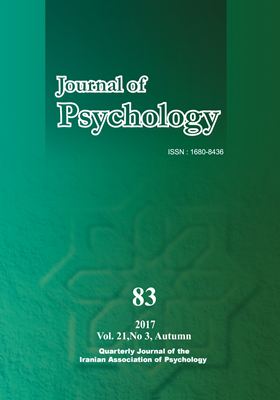Investigating the Predictive Role of Working Memory Capacity and Executive Functions for Alzheimer's Predisposition
Subject Areas :Forough Tafi 1 , Rouhollah Shahabi 2
1 - Islamic Azad University, Qazvin Branch, I.R.Iran
2 - Institute of Humanities and Cultural Studies
Keywords: Alzheimer's predisposition, working memory capacity, executive function, inhibition, shifting, updating,
Abstract :
The aim of this study was to investigate the predictive role of working memory capacity and executive functions (shifting, inhibition and updating) for Alzheimer›s predisposition. We selected 148 elderly people (75 male and 73 female) from Qazvin with available sampling procedure and they completed Mini Mental State Examination ( Alzheimer›s predisposition), the Digit Span in backward format Task (workingmemory capacity), Stroop (inhibition), Set- Switching Task (shifting) and Keep Track Task (updating). Data analysis was accomplished using analysis showed working memory and executive function totally predicted considerable amount (61 percents) of Alzheimer›s predisposition. At the end data were discussed in light of theory and practice.
امین زاده، انوشه و حسن آبادی، حمیدرضا (1389). نارسایی های شناختی زیربنایی در ناتوانی ریاضی. روانشناسی تحولی. روانشناسان ایرانی. 6 (23). 187-200.
انجمن روانپزشکی آمریکا (1393). راهنمای تشخیصی و آماری اختلالهای روانی (DSM-5).تهران. انتشارات ارجمند.
سیدیان، مازیار؛ فلاح، مهتاب؛ نوروزیان، مریم؛ نجات، سحرناز؛ دلاور، علی و قاسم زاده، حبیب اله (1386). تهیه و تعیین اعتبار نسخه فارسی آزمون کوتاه وضعیت ذهنی. مجله علمی سازمان نظام پزشکی جمهوری اسلامی ایران. 25 (4)، 414-408.
زارع، حسین و لطفی، راضیه (1394). اثر میزان بار و ظرفیت حافظه کاری بر فرایند مهار شناختی در تکلیف استروپ. مجله روانشناسی. 19 (2). 175- 187
شهابی، روح الله؛ اژه ای، جواد؛ آزادفلاح، پرویز و فرزاد،ولی اله (1393). مکانیسم زیربنایی رابطه حافظه کاری و هوش سیال. مجله روانشناسی. 18 (1). 3-24.
نجاتی، وحید (1389). کارکردهای شناختی اجرایی قطعه پیشانی مغز در سالمندان. مجله علوم رفتاری. 4(1). 59-64.
Alloway, T. P., Gathercole, S. E.,Willis, C., & Adams, A. M. (2004). A structural analysis of working memory and related cognitive skills in young children. Journal of Experimental Child Psychology, 87, 85-106.
Amieva, H., Phillips, L. H., Della Sala, S., & Henry, J. D (2004). Inhibitory functioning in Alzheimer's disease. Brain, 127, 949-964.
Baddeley, A., (2010). Working memory. Current Biology, 20(4), 136-141.
Baddeley AD, Cocchini G, Della Sala S, Logie R, & Spinnler H. (1991). Working memory and vigilance: Evidence from normal aging and Alzheimer’s disease. Brain Cogn; 41: 87-108.
Baudic S, Barba GD, Thibaudet Mc, Smagghe A, et al. (2006). Executive function deficitsin early Alzheimer’s disease and their relations with episodic memory. Archives of Clinical Neuropsychology 21(1):15-21.
Belleville, S., Peretz, I., & Malenfant, D. (1996). Examination of the working memory components in normal aging and in dementia of the Alzheimer type. Neuropsychologia, 34(3), 195-207.
Belanger, S., Belleville, S., & Gauthier, S. (2010). Inhibition impairments in Alzheimer’s disease, mild cognitive impairment and healthy aging: Effect of congruency proportion in a Stroop Task. Neuropsychologia, 48(2), 581-590.
Bull, R., & Espy, K. A. (2006). Working memory, executive functioning, and children’s mathematics. In S. Pickering (Ed)., Working memory and education. Elsevier Press.
Christoff K, Prabhakaran V, Dorfman J, Zhao Z, Kroger JK, Holyoak KJ, & Gabrieli J.D.: (2001). Rostrolateral prefrontal cortex involvement in relational integration during reasoning. Neuroimage; 14: 1136–1149.
Curwin, R. D. (2000). The central executive system of working memory and primary memory deficits in patients with probable alzheimers disease. Dissertation submitted to the schoolof graduate studies of the University of Ottawa.
Engle de Abreu, P. M. J., Conway, A. R. A., & Gathercole, S. E.(2010). Working memory and fluid intelligence in young children. Intelligence. 38, 552-561.
Gagnon, L. (2011). Working memory in alzheimers disease and mild cognitive impairment (MCI): assessment and intervention. University of Montreal. A dissertation for PhD degree of Philosophy.
Gathercole, S. E., Pickering, S. J., Ambridge, B., & Wearing, H. (2004). The structure of working memory from 4 to 15 years of age. Developmental Psychology, 40(2), 177-190.
Germano, C & Kinsella, G. J. (2005). Working memory and learning in early Alzheimer’s disease. Neuropsychology Review. 15 (1). 1-8.
Huntley, J. D., & Howard, R. J. (2010). Working memory in early Alzheimer’s disease; A neuropsychological review. International Journal of Geriatric Psychiatry. 25: 121-132.
Kensinger, E. A., Shearer, D. K., Growdon, J. H., Locascio, J. J. & Corkin, S. (2003). Working memory in mild Alzheimer’s disease and early Parkinson’s disease. Neuropsychology. 17 (2). 230-239.
Lemaire, P. (2010). Cognitive strategy variations during aging. Current Direction in Psychological Science. 19 (6)363-369.
Lim, H. K., Juh, R., Pae, C. U., Lee, B. T., Yoo, S. S., Ryu, S. H., et al. (2008). Altered verbal working memory process in patients with Alzheimer’s disease: An fMRI investigation. Neuropsychobiology, 57(4), 181-187. doi: 000147471.
McGuinness B1, Barrett SL, Craig D, Lawson J, & Passmore AP. (2010). Executive functioning in Alzheimer’s disease and vascular dementia. International Journal of Geriatric Psychiatry. 25(6):562-8.
Miyake, A., Friedman, N. P., Emerson, M. J., Witzki, A. H., Howerter, A., & Wager, T. D. (2000). The unity and diversity of EFs and their contributions to complex “frontal lobe” tasks: A latent variable analysis. Cognitive Psychology, 41,49–100
Owen AM, McMillan KM, Laird AR, & Bullmore E: (2005). N-back working memory paradigm: A meta-analysis of normative functional neuroimaging studies. Hum.Brain Mapp; 25: 46–59.
Pasquier, F., Grymonprez, L., Lebert, F., & Van der Linden, M. (2001). Memory impairmentdiffers in Frontotemporal dementia and Alzheimer’s disease. Neurocase. 7: 161–171
Perry, R. J., and Hodges, J. R. (1999). Attention and executive deficits in Alzheimer’s disease: A critical review. Brain 122: 383– 404.
Perry. J. C., Erzinclioglu, S. W., Berrios, G. E., dening, T. R. D & Hodges, J. R. H. (2001). Perception attention and working memory are disproportionately impaired in dementia with lewy bodies compared with Alzheimers disease. Neurol Neurosurg Psychiatry. 70: 157-164.
Wasylyshyn. C., Verhaeghen, P., & Sliwinski, M. (2011). Aging and task switching: A meta analysis. Psychological Aging. 26 (1). 15-20.


